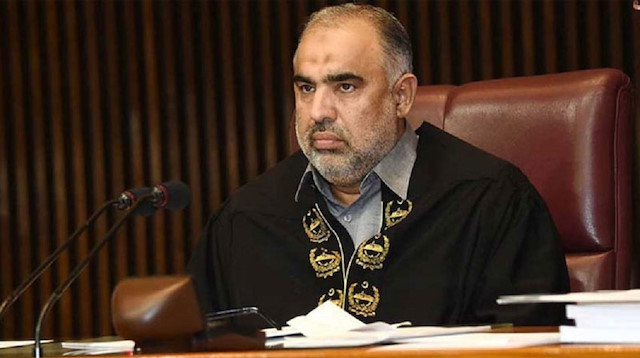
Pakistanis looking forward to receiving Turkish president later in October, Asad Qaiser tells Anadolu Agency
Pakistan and Turkey have always supported each other and will continue to do so, Pakistan’s National Assembly speaker said.
To further cement ties between the two "brother countries", the people and government of Pakistan are looking to host Turkish President Recep Tayyip Erdogan later this month, Asad Qaiser told Anadolu Agency in an interview on the sidelines of the regional speakers' conference in Istanbul.
"Pakistan-Turkey camaraderie is in all spheres and whatever be the condition, Pakistan will side with brothers of Turkey every time," Qaiser said when asked about Turkey's military Operation Peace Spring in northern Syria.
"And Pakistan will not stay behind when it comes to the challenges facing Turkey," Qaiser asserted.
"Our relations with Turkey are like this: Pakistan and Turkey are seen as one nation. People of the both countries love each other and such kinds of affection is not seen with any other country," he added.
Qaiser said his government and people of Pakistan would hold an "exemplary welcome ceremony" for Erdogan, who will embark on an official two-day visit to Pakistan on Oct. 23.
"President Erdogan and [Pakistan's] Prime Minister Imran Khan are two strong leaders of Muslim world," Qaiser said.
Referring to a joint Pakistan-Turkey event held at the UN last month to counter Islamophobia, Qaiser said: "Such kind of representation of Muslims at that level was never done before."
"The two are leaders of the new Muslim world order," he emphasized, saying: "The Whole Muslim world is looking up to them."
Quoting President Erdogan, Qaisar said Pakistan, Turkey and Malaysia are also launching a joint TV channel to counter anti-Islam propaganda.
Underlining that this TV channel would be a "major counter" to anti-Muslim disinformation, he added that the two countries would then "look towards trade".
- Parliament-to-parliament Relations
Qaiser said the two countries were in constant communication at the parliamentary level.
The regional speakers conference was founded by Pakistan and includes Iran, Turkey, Russia, Afghanistan and China. Besides Islamabad and Tehran, Istanbul has so far hosted the event too.
"I have met my counterpart several times and what we are trying is to have a cooperation between our parliaments' secretariats and give parliament a very important position to play its role in boosting our relations," Qaiser said.
"The aim is to learn from each other’s experiences,” he added, saying: "We are figuring out how it helps us boost trade and establish a joint mechanism to fight terrorism."
- 'India exposed before world'
He also touched upon the ongoing humanitarian situation in Indian-administered Jammu and Kashmir noting that the "truth of India" had been "exposed to the whole world”.
"What [Indian Prime Minister Narendra] Modi has done on Aug. 5 violated all human rights and turned Kashmir into a sub-jail," Qaiser alleged.
He stressed that Kashmiri people were "badly affected" in all spheres of life be it education, health or trade.
Jammu and Kashmir has been under a near-complete lockdown since the Indian government’s move on Aug. 5 to scrap the special status of Jammu and Kashmir.
Since then, the Indian government has blocked communication access and imposed restrictions on movement to thwart any protests in the region.
Several rights groups including the Human Rights Watch and Amnesty International have repeatedly called on India to lift restrictions and release political detainees.
India said that 93% of the restrictions have been eased in the conflict-ridden region, a claim that Anadolu Agency could not independently verify.
Qaiser said Pakistan simply wanted a resolution on the Kashmir dispute according to UN resolutions.
“It is the right of Kashmiris that they be given right to self-determination as promised by UN itself,” he said.
"The world is now aware of what kind of a democracy India is, that it does not respect UN resolutions, it is violating human rights,” Qaiser added.
He said "this kind of barbaric situation will not sustain in Kashmir because it is the right of Kashmiris [to resist it] and the international community should express its support to the people of the occupied region."
"One thing we need to know is that governments are not run due to oppression on people. It is not possible for India to sustain its position in Kashmir," Qaiser added.
India and Pakistan both hold the region of Kashmir in parts and claim it in full. China also controls part of the contested region, but it is India and Pakistan who have fought two wars over Kashmir.
- Khilafat Movement
Qaiser said his government would communicate and collaborate with Ankara to commemorate the centenary of the Khilafat Movement which started in the Indian sub-continent in 1919 to help the then-falling Ottoman Empire.
"It is one of the best phases of our history and it laid the foundations of our current day's bond between Pakistan and Turkey," he said.
The Khilafat movement (1919-1924) was a civil movement by Muslims in then-British colonial Indian sub-continent in the years following World War I. Its purpose was to pressure the British government to preserve the authority of the Ottoman Sultan as Caliph of Islam following the breakup of the Ottoman Empire at the end of the war.
- Pakistani community in Turkey
The speaker said Turkey hosts a huge number of Pakistani students, businessmen and people of different trade.
"They are playing an important role in cementing bilateral relations and we see it with sincerity and respect that overseas Pakistanis are helping Pakistan develop," he said.


